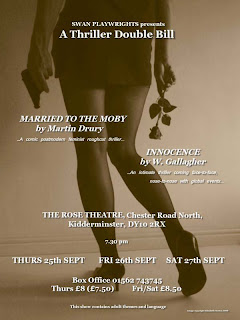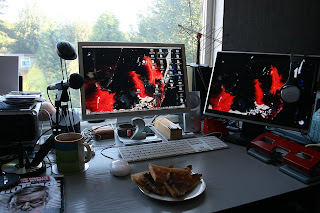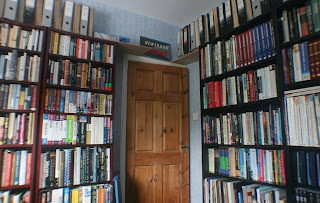You’ve missed this now but Grand Designs Live was at the NEC. And Sony had a presentation there on The House of the Future: all of the exciting technologies we can all look forward to. Obviously all Sony-based. And presumably all after the credit crunch.
For example, in the bright Sony world, you can have all your music in one place. Never dig out a CD again, just scroll through the cover artwork on a screen and choose what you want. When you put in a CD to copy it into this wonder system, said system will look out across the internet, will cast its eye far and retrieve for you all the track names and details.
If you don’t already do this routinely, you’re at least expecting me to say that I do. Yes, of course. For years now. And it’s because I’ve got a Mac. Got to tell you, my two-year-old Mac does this stuff vastly more smoothly, easily and without as much bloody fuss than this peek into the distant future of Sony.
I’ve always recognised that it’s very hard, perhaps impossible really, to write about the future. Sony’s solved this by being years behind and looking from there, which you have to agree is a cute way around the issue if ultimately unlikely to convince me to buy anything. But otherwise, nothing is ever what you expect in the future, you can’t predict successfully, so give up now. This might be a problem for science fiction writers, of which I’m just not one, but I don’t think so: SF is only costume drama that’s (typically) in the future. Just as Jane Austen isn’t dependent on crinoline for drama, Zonk Conquers The Galaxy is so much more than tin foil.
But somewhere along the way, television drama has screwed up the present too.
It used to be that characters on TV were glamorous, that they were in some or many ways aspirational idols. Jonathan and Jennifer Hart seemed so fabulously wealthy in the 1970s. The men and women from UNCLE were chic and sleek, they had their pen-based communicators. The Tomorrow People had their lava lamps.
Then we got computers.
TV characters, and really their writers, were faced with our knowing more than they did, of having more experience with this technology than they did. Drama is drama, I don’t care whether Ena Sharples has an iPhone or a BlackBerry, but power changed, attitudes changed. And we began getting these slick characters still acting slick, still now seeming to act superior – possibly not Ena – yet they were using ZX81s to take over the world. It became embarrassing. Countless 1980s and 90s dramas had hacker characters visibly pretending to type, just banging keys at random or sometimes not even actually hitting the keys, while impossible data magically appeared on screen. My beloved Sports Night, as late as 1998, mentioned a website address that couldn’t possibly work.
Old Doctor Who rested a plot turn on bubble memory: fine, I suppose, for about an hour in 1981 but there was a smugness that this was cutting-edge, that this was the latest thing. The Doctor even recognising what bubble memory was? I seem to remember knowing what it was at the time but I couldn’t recognise it now, let alone see how to use it to save the universe. And there was a 1986 Doctor Who episode where Mel (Bonnie Langford) gasped at the dangerous weapon, a “megabyte modem”.
I don’t see how you can write that and still be employed.
It’s not arrogant when it’s true, when you do know something the rest of us don’t. When the pilot of The West Wing introduced us to the term Potus, that felt genuinely new. Aaron Sorkin wrote somewhere about being worried about it, whether it was just a new term to him, and that he was talking a chance using it the way he did. (LAURIE: “Tell your friend Potus he has a stupid name.” SAM: “I would but he isn’t my friend, he’s my boss. And it isn’t his name, it’s his title. President of the United States.” Smash into the first episode’s titles.)
Knowing something we don’t and bringing to us, that’s fabulous. But it is is arrogance and so very much more when you don’t know what we do yet you carry on patronising anyway.
It’s not a pretty thing. TV is still trying to be as aspirational but because it’s failing, and failing stupidly, that’s what it can look like: it can look and feel and be extremely patronising. It doesn’t like looking stupid either, so it wants to tell technical stories – but because it’s patronising and superior, it believes we can’t understand these same stories. New writers on Casualty and the like will always jump up and down about their great idea for a Tourettes story, for instance. It’s great, they say in the certainty that we’ve never heard of it before, because it’s a disease that makes you swear all the time! Then they, sometimes amazingly slowly, put it together that primetime BBC1 is not going to allow a torrent of Tourettes language. So they water it down: he goes around saying Ooops all the time! That’s drama!
There’s an argument, too, that because we’re all so very plainly stupid, our TV heroes mustn’t be clever. You can see this in the US Presidential elections too: Sorkin wrote in the New York Times last month about how “The people who want English to be the official language of the United States are uncomfortable with their leaders being fluent in it”.
Consequently, if you’re smart in a TV drama, you’re inevitably a geek. If you’re the one who knows that using Windows will ultimately bring down the entire global financial network, you cannot be the one who can do anything about it. You have to be the one who tells the hero – and the hero must always give you a little put-down for being so nerdy.
So all you have to do is switch over from Bugs, walk away from Bonekickers – that’s a different argument but sound advice nonetheless – and don’t question Knight Rider very closely, and then all’s well. But just as technology has pervaded our lives for a very long time – I got my first email address 25 years ago – so it’s invading all dramas. So it should. But then you get things like Casualty.
Last year a little girl held the entire NHS to ransom with a USB stick in Casualty. She was eventually persuaded to plug this 1Gb drive into a USB slot and instantly – instantly – the whole Holby network boomed back into life. Phew. Richard Curtis co-wrote that episode.
The argument, I believe, is that most people won’t know what a USB stick is so I should get a life. But if you’re going to rest your drama on something you believe most people don’t know, how do you expect to involve them? Where are the stakes? What’s the human connection if you don’t know why these characters are so fussed? Isn’t that just as bad as when you know what a USB stick is and therefore know all these characters are utter idiots who have no right to be treating the public?
I love television drama because it involves you. I have a difficulty when it just sits there and tells me I’m an idiot.
William
there





